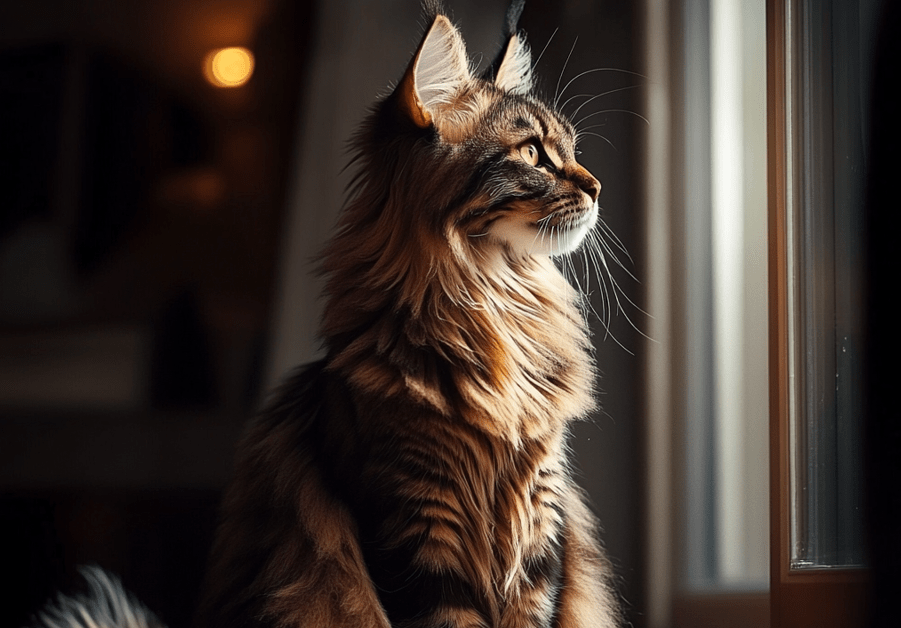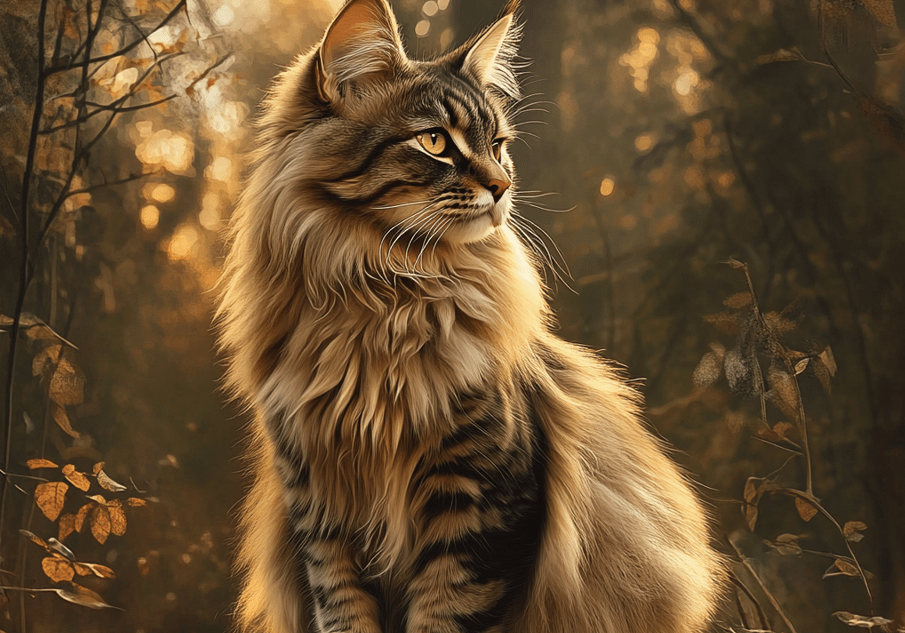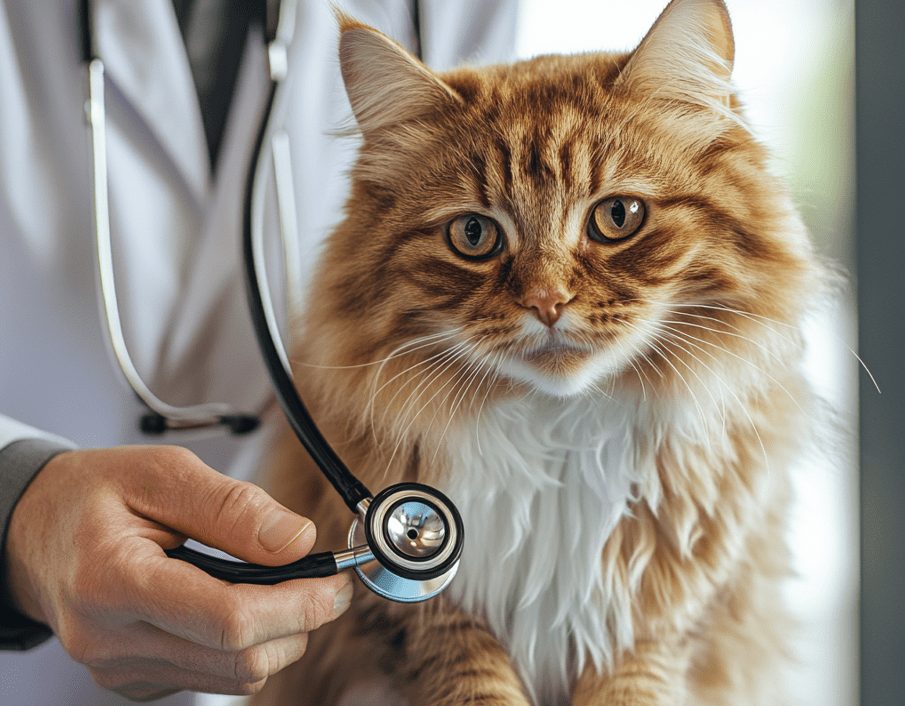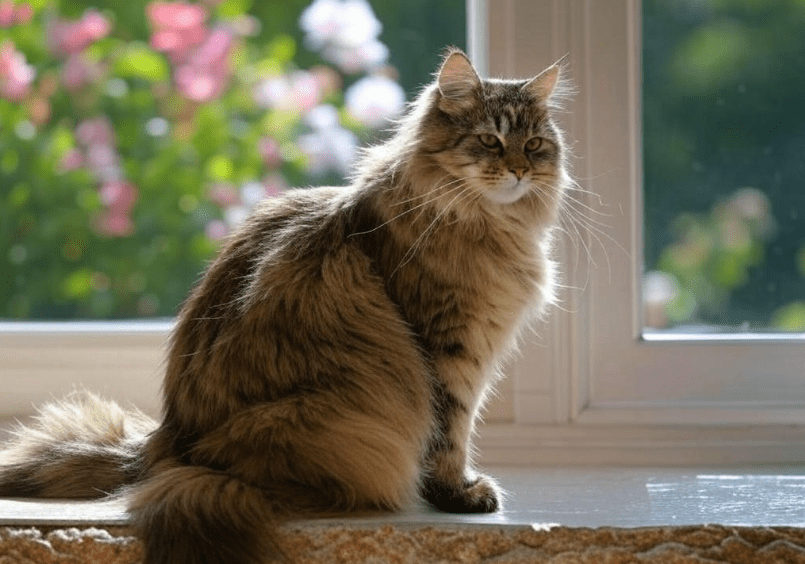
Maine Coon cats are known for their majestic appearance, friendly demeanor, and loyal nature. These large, sociable felines often form deep bonds with their owners, making them prone to experiencing separation anxiety when left alone. Maine Coon separation anxiety can manifest in various ways, such as excessive meowing, destructive behavior, or even health issues. If you’re a Maine Coon owner, understanding and addressing this issue is crucial for your cat’s well-being and your peace of mind. In this comprehensive guide, we’ll explore the causes, signs, and practical tips to help your Maine Coon cope with separation anxiety effectively.
What Is Maine Coon Separation Anxiety?
Separation anxiety in Maine Coon cats occurs when they feel stressed or anxious due to being separated from their owners or primary caregivers. Maine Coons are particularly susceptible because of their affectionate and social nature. Unlike more independent breeds, Maine Coons thrive on interaction and companionship, often following their owners around the house and seeking attention. When left alone for extended periods, they may experience distress, leading to behavioral changes.
This condition isn’t unique to Maine Coons, but their size, intelligence, and emotional sensitivity can make the symptoms more pronounced. Recognizing the signs early and taking proactive steps can prevent long-term issues and ensure your Maine Coon remains happy and healthy.
Why Are Maine Coons Prone to Separation Anxiety?
Several factors contribute to why Maine Coon cats may develop separation anxiety:
1. Strong Attachment to Owners
Maine Coons are often described as “dog-like” due to their loyalty and attachment to their owners. They enjoy being involved in their owner’s daily activities, whether it’s sitting on your lap while you work or following you from room to room. This strong bond can make them more sensitive to your absence.
2. High Intelligence and Emotional Sensitivity
Maine Coons are highly intelligent cats with a keen awareness of their surroundings. Their emotional sensitivity means they can pick up on changes in routine or your mood, which may heighten their anxiety when you’re not around.
3. Need for Stimulation
As an active and curious breed, Maine Coons require mental and physical stimulation. Without proper enrichment, they may become bored or stressed when left alone, exacerbating feelings of anxiety.
4. Changes in Routine
Maine Coons thrive on consistency. Sudden changes, such as a new work schedule, moving to a new home, or the addition of another pet, can trigger anxiety in these cats.
5. Past Trauma or Rehoming
Maine Coons that have experienced trauma, neglect, or multiple rehoming situations may be more prone to separation anxiety. If your cat has a history of abandonment, they might fear being left alone again.
Signs of Separation Anxiety in Maine Coon Cats
Identifying separation anxiety in your Maine Coon is the first step to addressing it. Here are some common signs to watch for:
Excessive Vocalization: If your Maine Coon meows, yowls, or cries excessively when you’re about to leave or while you’re gone, it could be a sign of distress.
Destructive Behavior: Scratching furniture, knocking over items, or chewing on objects may indicate your cat is trying to cope with anxiety.
Inappropriate Elimination: Urinating or defecating outside the litter box, especially when you’re away, can be a stress response.
Pacing or Restlessness: Constant pacing, inability to settle down, or following you anxiously as you prepare to leave are red flags.
Over-Grooming: Excessive licking or grooming, sometimes leading to bald patches, can be a self-soothing behavior linked to anxiety.
Loss of Appetite: Refusing to eat or drink while you’re away may indicate your Maine Coon is too stressed to focus on food.
Clinginess: If your cat becomes overly attached, following you everywhere or demanding constant attention, they may fear being left alone.
If you notice any of these behaviors, it’s essential to address them promptly to prevent the anxiety from worsening.
Practical Tips to Help Your Maine Coon Cope with Separation Anxiety
Managing Maine Coon separation anxiety requires a combination of environmental adjustments, behavioral training, and emotional support. Here are actionable tips to help your cat feel more secure when you’re not around:
1. Create a Safe and Stimulating Environment
Maine Coons need a space where they feel secure and entertained while you’re away. Consider the following:
Provide a Comfort Zone: Set up a cozy area with your cat’s bed, favorite blanket, or an item that smells like you (like an old t-shirt). This can provide comfort in your absence.
Offer Interactive Toys: Puzzle feeders, treat-dispensing toys, and catnip-filled toys can keep your Maine Coon engaged. Rotate toys regularly to maintain their interest.
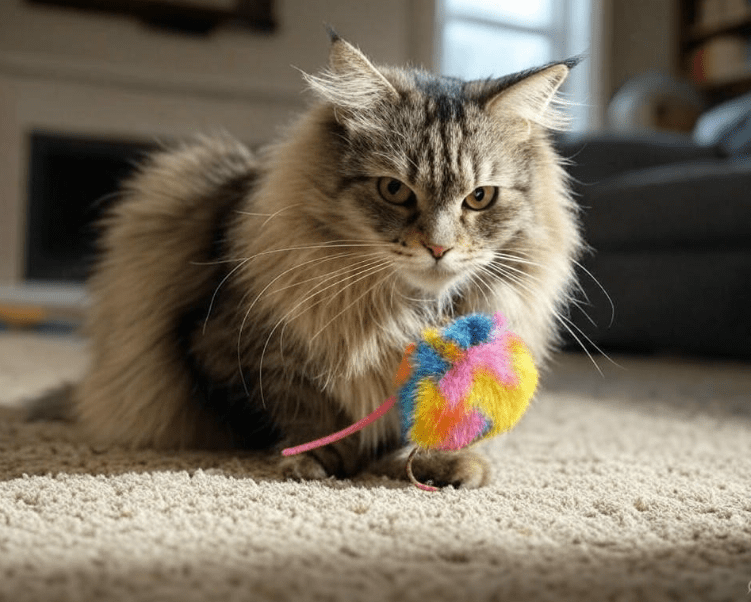
Install a Cat Tree or Perch: Maine Coons love to climb and observe their surroundings. A tall cat tree or window perch allows them to watch birds or outdoor activity, keeping them entertained.
Play Calming Music: Soft classical music or cat-specific calming playlists can help reduce stress and create a soothing atmosphere.
2. Gradually Desensitize Your Maine Coon to Your Absence
Desensitization involves teaching your cat that being alone is not a cause for alarm. Here’s how to do it:
Start with Short Absences: Leave the house for short periods (e.g., 5–10 minutes) and gradually increase the time as your cat becomes more comfortable.
Avoid Emotional Goodbyes: Keep departures and arrivals low-key. Avoid making a big fuss when you leave or return, as this can heighten your cat’s anxiety.
Practice Pre-Departure Cues: Maine Coons often pick up on cues like grabbing your keys or putting on shoes. Practice these actions without leaving to reduce their association with your absence.
3. Provide Mental and Physical Stimulation Before Leaving
A tired Maine Coon is less likely to feel anxious. Engage your cat in activities before you leave to help them relax:
Playtime: Spend 15–20 minutes playing with your Maine Coon using a feather wand, laser pointer, or ball. This helps burn off energy and provides bonding time.
Training Sessions: Maine Coons are intelligent and enjoy learning. Teach them simple tricks like sitting or fetching to keep their mind engaged.
Food Puzzles: Hide treats around the house or use a puzzle feeder to encourage foraging behavior, which can keep your cat occupied for hours.
4. Use Technology to Stay Connected
Technology can help bridge the gap when you’re away:
Pet Cameras: Invest in a pet camera with two-way audio. You can check on your Maine Coon and talk to them, which may provide reassurance.
Automatic Feeders: Schedule meals throughout the day with an automatic feeder to maintain your cat’s routine and give them something to look forward to.
Interactive Toys with Apps: Some toys can be controlled remotely via smartphone apps, allowing you to play with your cat even when you’re not home.
5. Consider a Companion for Your Maine Coon
Maine Coons are social cats and often benefit from having a companion. If your cat struggles with being alone, introducing another pet might help:
Adopt Another Cat: A second cat, especially one with a compatible personality, can provide companionship. Ensure proper introductions to avoid stress.

Hire a Pet Sitter: If adopting another pet isn’t an option, hire a pet sitter or ask a trusted friend to visit your Maine Coon while you’re away.
6. Use Calming Products and Supplements
Several products can help reduce anxiety in Maine Coon cats:
Pheromone Diffusers: Products like Feliway mimic the calming pheromones a mother cat produces, helping to reduce stress.
Calming Treats or Supplements: Look for vet-recommended treats or supplements containing ingredients like L-theanine, chamomile, or valerian root.
Anxiety Wraps: A snug-fitting wrap, like a ThunderShirt, can provide gentle pressure that helps calm your cat.
Always consult your veterinarian before introducing new supplements or products to ensure they’re safe for your Maine Coon.
7. Maintain a Consistent Routine
Maine Coons thrive on predictability. Stick to a regular schedule for feeding, playtime, and litter box cleaning. If your work schedule changes, gradually adjust your cat’s routine to help them adapt.
8. Address Underlying Health Issues
Sometimes, behaviors mistaken for separation anxiety may be linked to medical issues. For example:
Pain or Discomfort: If your Maine Coon is in pain (e.g., from arthritis or dental issues), they may act out when you’re not around.
Hyperthyroidism: This common condition in older cats can cause restlessness and vocalization.
Urinary Issues: Stress can lead to urinary tract infections, which may cause inappropriate elimination.
Schedule a vet visit to rule out any health problems that might be contributing to your cat’s behavior.
9. Seek Professional Help if Needed
If your Maine Coon’s separation anxiety doesn’t improve with the above strategies, consider consulting a professional:
Veterinarian: A vet can assess your cat for underlying health issues and recommend anti-anxiety medications if necessary.
Feline Behaviorist: A certified cat behaviorist can create a tailored plan to address your Maine Coon’s specific needs.
Training Programs: Some behaviorists offer training programs to help cats cope with anxiety through positive reinforcement.
How to Prevent Maine Coon Separation Anxiety in the Future
Preventing separation anxiety starts with building your Maine Coon’s confidence and independence from an early age:
Socialization: Expose your Maine Coon kitten to different people, pets, and environments to help them become well-adjusted.
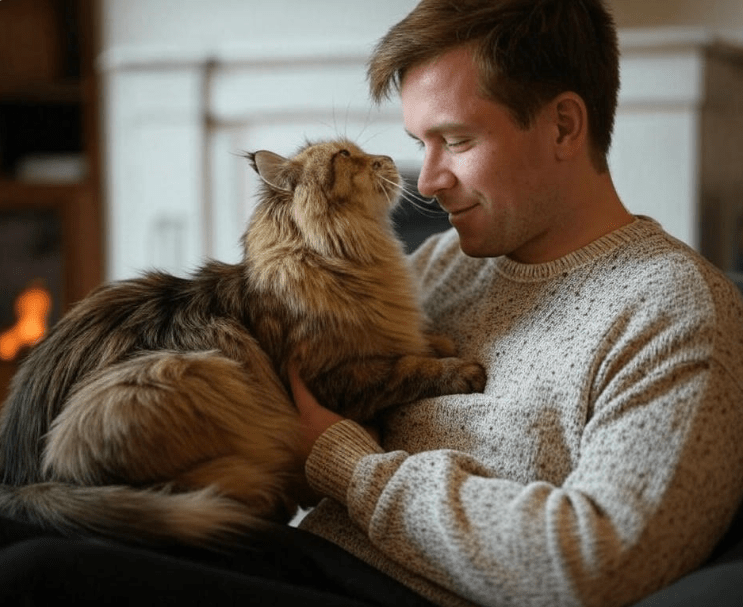
Encourage Independent Play: Provide toys and activities that your cat can enjoy on their own, such as puzzle feeders or solo-play toys.
Avoid Over-Dependence: While it’s tempting to shower your Maine Coon with attention, encourage them to spend some time alone each day to build resilience.
Start Early with Desensitization: If you know you’ll be leaving your cat alone regularly, start desensitization training as soon as you bring them home.
Common Mistakes to Avoid When Managing Maine Coon Separation Anxiety
While trying to help your Maine Coon, avoid these common pitfalls:
Punishing Bad Behavior: Yelling or punishing your cat for destructive behavior will only increase their stress and worsen the problem.
Leaving Without Preparation: Always ensure your cat has food, water, toys, and a clean litter box before leaving.
Ignoring the Problem: Separation anxiety won’t resolve on its own. Ignoring the signs can lead to chronic stress and health issues for your Maine Coon.
Making Sudden Changes: Avoid abrupt changes to your cat’s routine or environment, as this can trigger or worsen anxiety.
When to Seek Emergency Help
In rare cases, separation anxiety can lead to severe issues that require immediate attention:
Self-Harm: If your Maine Coon is over-grooming to the point of causing injury or showing signs of self-mutilation, contact your vet immediately.
Refusal to Eat or Drink: Prolonged refusal to eat or drink can lead to dehydration or hepatic lipidosis (fatty liver disease), a life-threatening condition in cats.
Extreme Aggression or Fear: If your cat becomes aggressive or extremely fearful, professional intervention is necessary to ensure their safety and yours.
Conclusion
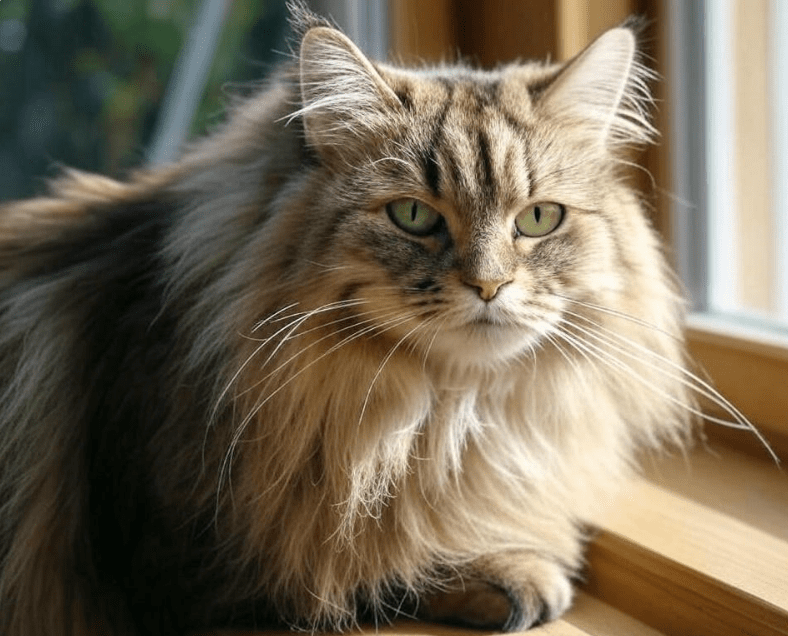
Maine Coon separation anxiety can be challenging for both you and your cat, but with patience, understanding, and the right strategies, you can help your feline friend feel more secure. By creating a stimulating environment, maintaining a consistent routine, and using desensitization techniques, you can reduce your Maine Coon’s anxiety and strengthen your bond. If the problem persists, don’t hesitate to seek professional help from a veterinarian or feline behaviorist. With the tips outlined in this guide, you’ll be well-equipped to support your Maine Coon and ensure they lead a happy, stress-free life—even when you’re not around.

